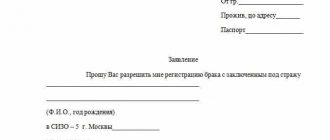The explanations of the person involved in the case vary depending on the category of the case and the authority before which the case is being considered. All possible differences in drawing up or giving explanations will be discussed below. Files in .DOC: Form of explanation of a person participating in the case Sample explanation of a person participating in the case
Explanation or interrogation
Leaving aside legal arguments about the difference between interrogation and giving explanations, the difference between them can be explained very simply.
Explanations are made before things become actions. That is, from the moment the procedure for considering a civil, criminal or administrative case begins, all explanations of the participants in the process become interrogation.
To make it clearer, let's explain the difference with examples. So:
- Before the initiation of a criminal case, the investigative authorities select explanations. After a criminal case is initiated, all testimony of the participants in the process is formalized in the form of an interrogation. Witnesses, victims, experts and specialists are warned about liability for giving false testimony, but suspects and accused are not;
- in civil cases, explanations in legal proceedings are given by the plaintiff, defendant and third parties. Testimony of witnesses, experts and specialists is formalized in the form of an interrogation with an explanation of liability for giving false testimony. The parties to the case, that is, the plaintiff, defendant and third parties are not warned of liability;
- Until a protocol on an administrative offense is drawn up, explanations are taken from interested parties. After drawing up the protocol, explanations are given in the form of an interrogation.
Suspects, accused and defendants have the right to refuse to testify. This possibility is not allowed for victims and witnesses.
In their structure, explanations and interrogation are no different from each other. That is, the difference is purely procedural.
Explanations of the law and “by concepts”
Currently, as a rule, in proving occupation of a higher position in the criminal hierarchy - a crime under Art. 210.1 of the Criminal Code of the Russian Federation, a questioning (explanation) of the person against whom it is planned to initiate a criminal case (or initiate criminal prosecution) is involved. The evidentiary criminal procedural value of such explanations can be very controversial in view of the following.
The calculation of operational workers that a person occupying a higher position in the criminal hierarchy is obliged “according to the concepts” (criminal unspoken code) to answer (explain) such questions to everyone and everything in a popular manner is no longer very justified. Increasingly, such surveys, in contrast to frank ones before the entry into force of Art. 210.1 of the Criminal Code of the Russian Federation look something like this:
Question: Are you a thief in law?
Answer: I am a legal pensioner.
Question: What position do you occupy in the criminal hierarchy?
Answer: I occupy my position, I do not occupy someone else’s position.
Question: Do you occupy the highest position in the criminal hierarchy?
Answer: Considering a person that his position is superior is deceptive, because there is always someone higher...
At one time, it seems, Alphonse Capone (USA), when asked by a journalist about his affiliation with the mafia, answered with a double meaning: “I am a businessman.”
Nowadays, more and more often in the answers of the interviewed “authoritative” persons there are references to lawyers. From the simple: “All questions in the presence of my lawyer,” to a relatively complex answer to the question of occupying a position in the criminal hierarchy: “My position now with you allows me to answer all your questions only with the participation of my lawyer.” Of course, this is legal, and inviting a defense attorney in this case is procedurally justified, and here’s why.
Part 1 art. 48 of the Constitution of the Russian Federation stipulates: “everyone is guaranteed the right to receive qualified legal assistance.”
Art. 89 of the Code of Criminal Procedure of the Russian Federation (“Use in proving the results of operational investigative activities”) establishes the following legal rule: “in the process of proof, the use of the results of operational investigative activities is prohibited if they do not meet the requirements for evidence by this Code.”
Clause 1 part 2 art. 75 of the Code of Criminal Procedure of the Russian Federation classifies as inadmissible evidence the testimony of a suspect, as well as the accused, given during pre-trial proceedings in a criminal case in the absence of a defense lawyer, including cases of refusal of a defense lawyer, and not confirmed by the suspect or accused in court.
The legal justification for the participation of a defense attorney in the ORM is also the following constitutional norms of the Russian Federation:
– “Man, his rights and freedoms are the highest value. Recognition, observance and protection of human and civil rights and freedoms is the duty of the state” (Article 2 of the Constitution of the Russian Federation);
– “state authorities and their officials must comply with the Constitution of the Russian Federation” (Part 2 of Article 15 of the Constitution of the Russian Federation);
– “the rights and freedoms of man and citizen are directly applicable. They determine the meaning, content and application of laws” (Article 18 of the Constitution of the Russian Federation);
– “state protection of the rights and freedoms of man and citizen in the Russian Federation is guaranteed” (Part 1 of Article 45 of the Constitution of the Russian Federation).
In Resolution No. 11-P[1] of June 27, 2000, the Constitutional Court of the Russian Federation specifically explained the following:
– “...The Constitution of the Russian Federation does not connect the provision of assistance from a lawyer (defender) with the formal recognition of a person as a suspect or accused, and, consequently, with the moment of adoption of any procedural act by the body of inquiry, investigation or prosecutor’s office, and does not give the federal legislator the right to establish restrictive conditions for its implementation" (paragraph two of paragraph 2 of the descriptive and motivational part of the text of this resolution);
– “legal assistance from a lawyer should be provided to everyone” (clause 16 of the descriptive and motivational part of the text of this resolution.”
The mentality of the ECHR is characterized by the identification of operational investigative activities (ORM) with investigative actions. As a result, when the European Court talks about investigative bodies, it also includes operational apparatus.
In accordance with subparagraph “c” of paragraph 3 of Art. 6 of the European Convention, “every person accused of a criminal offense has the right to defend himself through legal counsel of his own choosing,” and according to subparagraph “b” of the same paragraph 3 of Art. 6 of the same European Convention, in addition, also “have sufficient time and opportunities to prepare their defense.” At the same time, the norms of this European Convention do not provide a legal definition of the concept of the procedural status of “accused”. The jurisprudence of the ECHR proceeds not from a formal, but from a substantive (essential) understanding of accusation and suspicion, as well as the procedural status of the suspect and the accused[2].
A similar legal position is taken by the Constitutional Court of the Russian Federation in its resolution of June 27, 2000 No. 11-P[3], as well as in its ruling of January 22, 2004 No. 119-O[4].
In these judicial acts, the ECHR and the Constitutional Court of the Russian Federation explain that the recognition of a person as a suspect, accused or other participant in criminal proceedings is not associated with the issuance of any official criminal procedural documents or decisions against this person provided for by the criminal procedural law, but is conditioned the essential, factual position of a given person within the framework of criminal prosecution.
Consequently, in the above-mentioned situations, when open operational investigations are carried out against them, citizens inherently occupy the procedural status of suspects and they must be ensured their constitutional right to defense.
The general conditions under which explanations can be used as evidence in a criminal case (subject to the provisions of Article 75 and the Code of Criminal Procedure of the Russian Federation) are as follows.
- The literal content of the legal norm of Art. 51 of the Constitution of the Russian Federation - “not to testify against oneself, one’s spouse and close relatives, the circle of whom is determined by federal law.” In paragraph 18 of the resolution of the Plenum of the Supreme Court of the Russian Federation dated October 31, 1995 No. 8 “On some issues of the application by courts of the Constitution of the Russian Federation in the administration of justice” (as amended by the resolution dated April 16, 2013 No. 9) it is specifically noted that failure to comply with this requirement entails recognition of the person’s explanations as inadmissible evidence.
The European Court of Human Rights in the case of Zaichenko v. Russia stated: “Law enforcement agencies were obliged to notify the citizen of his right not to incriminate himself and to remain silent. There was a violation of Art. 6 of the European Convention for the Protection of Human Rights and Fundamental Freedoms”[5].
The concept of close relatives is given in paragraph 4 of Art. 5 of the Code of Criminal Procedure of the Russian Federation (spouse, parents, children, adoptive parents, adopted children, siblings, grandparents, grandchildren).
- By analogy with the interrogation protocol, it should be explained to the person being questioned against signature that these explanations can be used in the course of further criminal proceedings as evidence of the guilt of the person being questioned or another person, even in the event of a subsequent refusal by the person being questioned to give these explanations.
- Also, judicial practice may take the following defense position: “A person who himself was an eyewitness to these events cannot conduct procedural activities.”
Practice shows that after many operational investigations are carried out, the subjects of their conduct - law enforcement officers - direct eyewitnesses, immediately begin interviewing persons of interest, receiving written explanations from them. These explanations are legalized in criminal procedural evidence. Subsequently, after the initiation of a criminal case on the basis of the above-mentioned materials presented, the investigator interrogates the operational workers themselves as witnesses. Under such circumstances, the defense may raise the question of recognizing such explanations as inadmissible evidence.
[1] In the case of verifying the constitutionality of the provisions of part one of Article 47 and part two of Article 51 of the Criminal Procedure Code of the RSFSR in connection with the complaint of citizen V.I. Maslova: Resolution of the Constitutional Court of the Russian Federation of June 27, 2000 No. 11 - P.
[2] ECtHR Judgment in the Deweer case of 27 February 1980, Series A, no. 35, para 44, 46. Judgment of the ECtHR in the Eckle case of 15 July 1982, Series A, no. 51, para 73. ECtHR judgment in the Foti case of 10 December 1982, Series A, no. 56, para 52.
[3] In the case of verifying the constitutionality of the provisions of part one of Article 47 and part two of Article 51 of the Criminal Procedure Code of the RSFSR in connection with the complaint of citizen V.I. Maslova: Resolution of the Constitutional Court of the Russian Federation of June 27, 2000 No. 11 - P.
[4] On the complaint of citizen Lily Mikhailovna Semenova about the violation of her constitutional rights by part four of Article 354 of the Criminal Procedure Code of the Russian Federation: determination of the Constitutional Court of the Russian Federation of January 22, 2004 No. 119 - O.
[5] Bulletin of the European Court of Human Rights. 2010. No. 7. P. 16.
Orally or in writing
Persons participating in the case have the right to give both oral and written testimony.
Oral testimony will be recorded from the words of the participant in the process by the investigator, the person authorized to initiate administrative materials or the secretary of the court session. After the recording is completed, the participant in the process will be asked to review the completeness of the recording and make comments. If there are no comments, the participant in the process will be asked to sign the testimony.
Written testimonies of persons participating in the case are attached to the case materials.
The inclusion of written testimony when considering a case in court is carried out at the request of the relevant participant in the process. That is, the participant in the process reads out his written testimony and then asks the court to attach it to the protocol.
For investigative authorities, such a petition is not required. A participant in the process can simply state that he wants to record his testimony himself.
Explanations on administrative materials are almost always recorded by the participants in the process themselves. Moreover, sometimes explanations are included in an already completed protocol on an administrative offense.
Rules for giving explanations
The beginning of the explanations also depends on the category of the case.
Explanations by plaintiffs, defendants, and third parties in a civil case always begin with whether the litigant supports or disagrees with the plaintiff's claims. So:
- the plaintiff at the beginning of his explanations states that he supports his claims;
- The defendant begins with whether he admits the claim or admits it partially, or does not admit it at all.
After this introductory phrase, you can begin to present the events on which the party to the case bases their position.
If a civil case falls into the category of so-called “quarrelsome” cases, then it is also advisable to dwell on the relationship with the opposing procedural party. For example, “I have been in a registered marriage with the plaintiff since 2010. In 2015, the marriage was dissolved. The relationship between us at the moment is hostile.”
The rules for giving explanations in criminal proceedings also define several routine introductory phrases. The suspect, accused or defendant begins their explanations something like this: “I understand the accusation, I don’t admit guilt (I admit it partially, I admit it completely). On the merits of the accusation brought against me, I can explain the following....”
The victim and witnesses must first explain at the beginning of their testimony whether they know the accused. For example, “I know the accused, my relationship with him is friendly (hostile or no relationship).”
How to write an explanation to the police, sample form
The explanation can be handwritten or typed on a computer. It must contain information relating to events of interest to the police, date, signature, place of compilation, and information about the identity of the person being interviewed.
Sometimes the police office already has an explanatory form that must be filled out in your own hand. When filling out, the investigator or district police officer may ask specific questions or ask you to write about the event as a whole, without specifying details. It all depends on the situation in connection with which the need for a survey arose, but in any case, you should remember to completely read the entire document, and only then should a personal signature be affixed with a transcript of the surname:
EXPLANATION (example)
Nsk 07/20/2020, 12:00
Investigator of the Leninsky department of inquiry of the Ministry of Internal Affairs for the city of Nsk, police captain L.O. Verbina, checking the statement of N.R. Usatova. about a crime received by the Department of the Ministry of Internal Affairs for the city of N-sk on July 17, 2020, in accordance with Part 1 of Art. 86 and part 1 of Art. 144 of the Code of Criminal Procedure of the Russian Federation, received an explanation from a citizen:
- Full name – Polyakov Andrey Gennadievich
- Year and place of birth – 09/01/1987, Nsk
- Address, telephone – st. Lenina, 50, Nsk, tel. 8934848
- Passport, citizenship - 1111 No. 646464, issued on January 31, 2017 at the Federal Migration Service for Ns-ku, Russian Federation
- Education, marital status – higher, single
- Place of work – temporarily closed.
Provisions of Art. 51 of the Constitution of the Russian Federation, the right to a lawyer is explained and understandable. I want to give explanations, I don’t need a lawyer.
Based on the essence of the questions asked to me, I can explain the following. With Usatova N.R. I know her, she is my roommate, I have no hostile relationship with her, I live with her at the above address. 07/17/2020 I, Usatova N.R., Golikov P.D. At about 20:00 we all drank alcoholic drinks together at our house, at the address: st. Lenina, 50, Nsk. Between me and Usatova N.R. there was a conflict in which P.D. Golikov intervened. The latter was heavily intoxicated and began to threaten N.R. Usatova. with a knife and hit her in the face. The blow was struck with the right hand (palm) twice, causing a bruise to form on the woman’s partner. Usatova contacted the medical center and the police. There is nothing more to explain.
Handwritten, signature, full name.
The explanation was accepted by: investigator of the Leninsky department of inquiry of the Ministry of Internal Affairs for the city of N-sk, police captain Verbina L.O., signature.
This sample statement to the police can be used in different situations.
If the document was printed from the words of a citizen, then at the end it is necessary to sign “from my words it was written (printed) correctly, read by me.” And only after the compiled text has actually been read, it is necessary to put your signature.
Ask for a copy of the explanation or take a photograph with the permission of the investigator.







